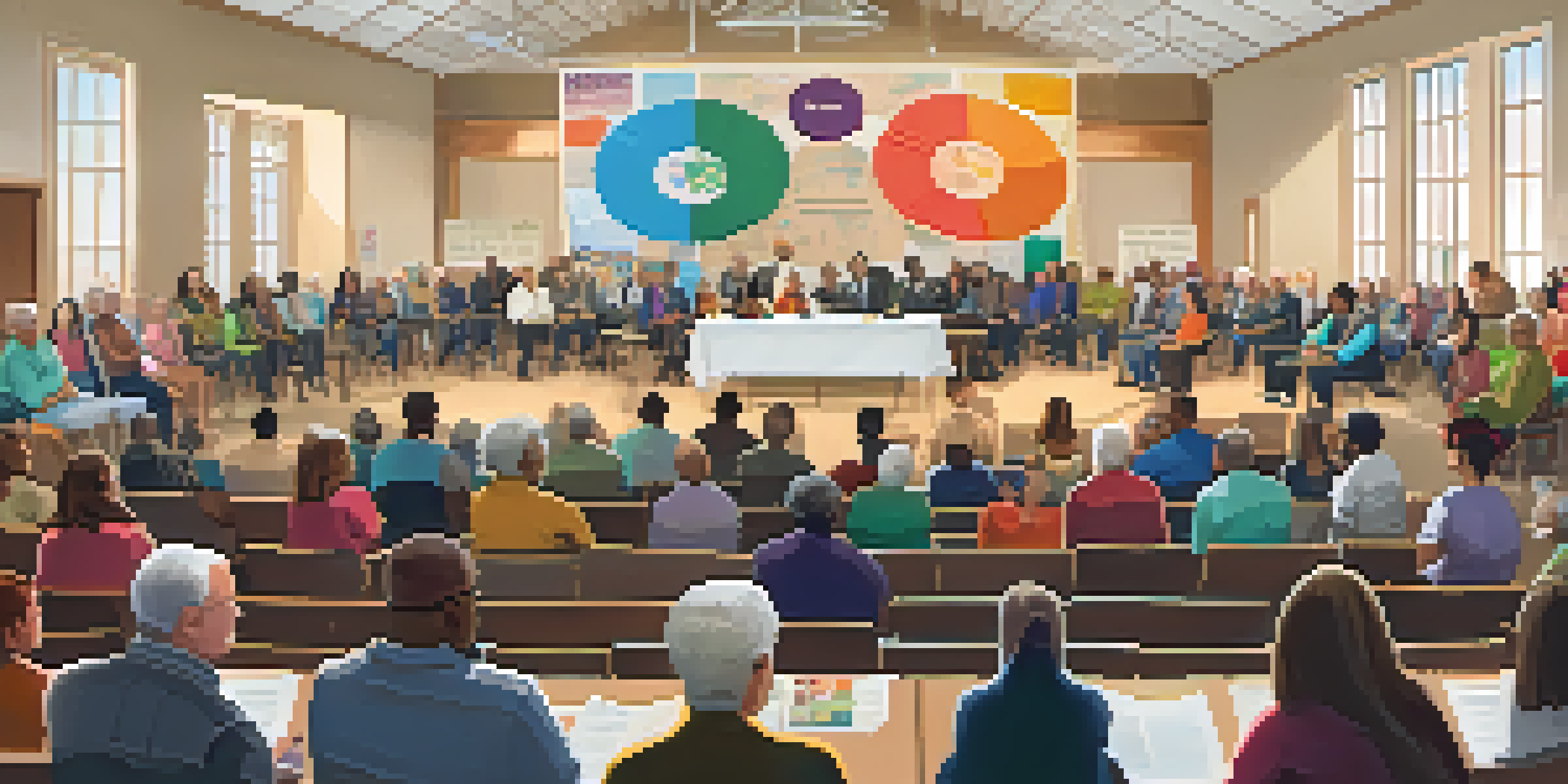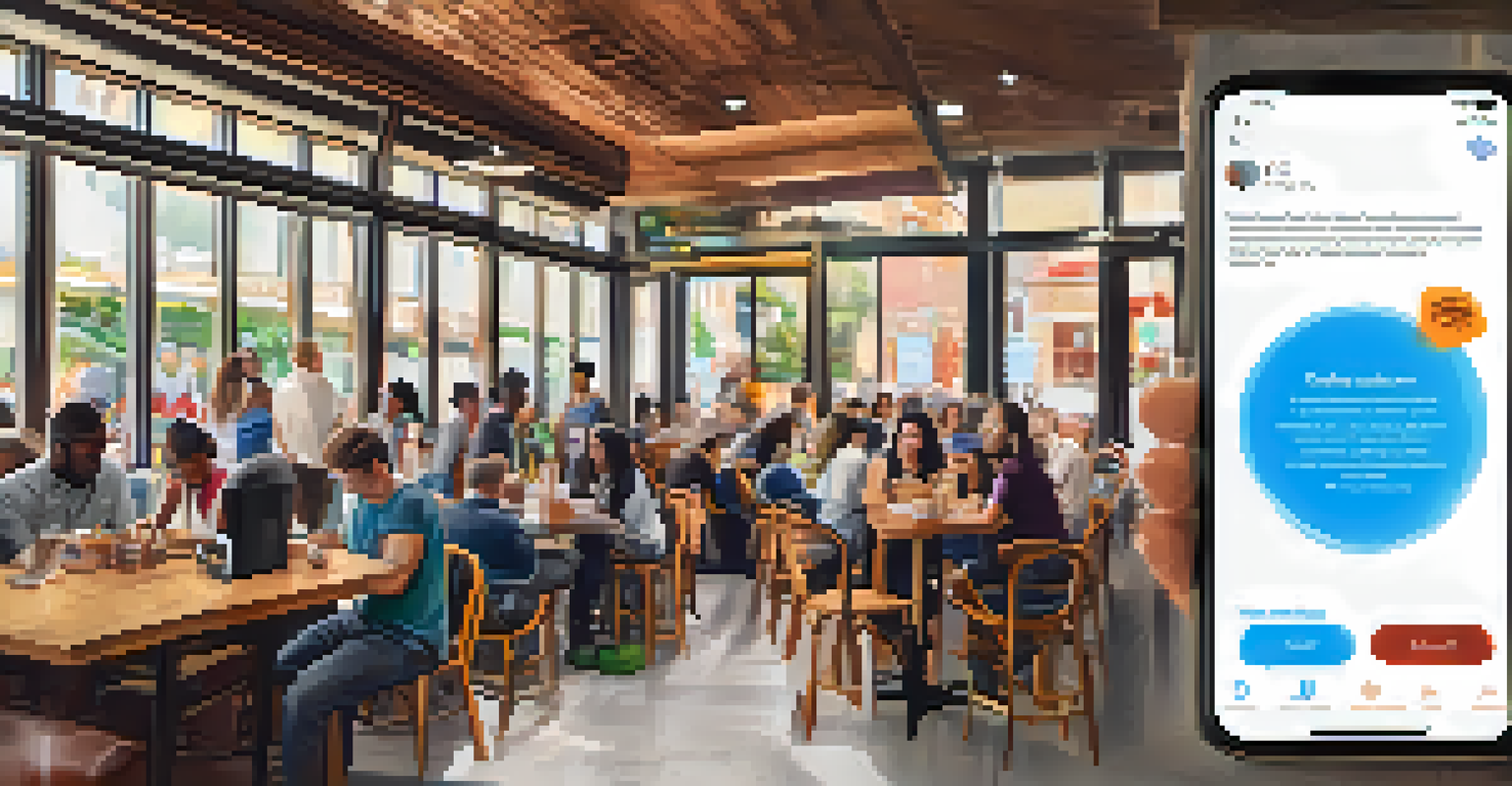Understanding Civic Engagement: A Guide for Local Residents

What is Civic Engagement and Why It Matters
Civic engagement refers to the ways in which individuals participate in their community and society. It can include voting, attending town hall meetings, or volunteering. Engaging with civic life is essential as it helps shape the policies and decisions that affect our daily lives.
Civic engagement is not just a nice thing to do; it is a critical part of our democracy.
When residents get involved, they contribute to a vibrant community where voices are heard, and change can happen. It's not just about individual benefits; civic engagement fosters a sense of belonging and responsibility. Essentially, when we engage, we create a better living environment for everyone.
Moreover, civic engagement can lead to stronger relationships among community members. It's an opportunity to collaborate, share ideas, and work towards common goals. When people come together, they can tackle challenges more effectively and foster a spirit of unity.
Different Forms of Civic Engagement
Civic engagement takes many forms, and understanding these can help you find the right fit for your interests and skills. From volunteering with local charities to participating in community forums, there's a wide range of opportunities available. Each type offers a unique way to contribute and connect with others in your area.

One popular form of engagement is voting in local elections. This is your chance to voice your opinion on candidates and policies that affect your community. Additionally, joining local advocacy groups can amplify your impact by collaborating with others who share your passions and concerns.
Civic Engagement Shapes Communities
Engaging in civic activities empowers individuals to influence local policies and foster a sense of belonging.
Another form is attending community meetings or workshops. These gatherings provide insights into local issues and often serve as a platform for residents to express their views. Whether you are sharing your ideas or listening to others, these interactions foster a sense of community and collaboration.
Benefits of Civic Engagement for Individuals
Participating in civic engagement offers numerous personal benefits. For starters, it can enhance your understanding of local issues and policies, making you a more informed citizen. This knowledge not only empowers you but also equips you to make better decisions in your daily life.
The best way to find yourself is to lose yourself in the service of others.
Engaging with your community can also improve your social and networking skills. By meeting new people and collaborating on projects, you expand your circle of connections. These relationships can lead to lasting friendships and professional opportunities.
Furthermore, civic engagement often leads to a sense of fulfillment and purpose. Knowing that you're contributing to the greater good can boost your mental well-being and overall happiness. It’s about finding meaning in your actions and making a positive impact.
How to Get Started with Civic Engagement
Getting started with civic engagement can feel overwhelming, but it doesn’t have to be. Begin by identifying your interests and the issues that matter most to you. This could be anything from environmental concerns to education or social justice. Understanding what drives you will help guide your involvement.
Next, research local organizations or groups that align with your interests. Many communities have resources, such as websites or social media pages, that list volunteer opportunities and upcoming events. Don't hesitate to reach out and ask how you can get involved or contribute.
Diverse Ways to Get Involved
From voting to volunteering, there are numerous avenues for individuals to participate and connect with their communities.
Lastly, start small. Attend a local meeting, volunteer for a few hours, or even follow community leaders on social media. Each small step builds your confidence and connections, making it easier to engage more deeply over time. Remember, every contribution counts!
Overcoming Barriers to Civic Engagement
Despite the benefits, many residents face barriers to civic engagement. Time constraints, lack of information, and feelings of inadequacy can all deter individuals from getting involved. Recognizing these obstacles is the first step towards overcoming them.
To address time constraints, consider prioritizing civic activities in your schedule. Even setting aside just one hour a month for community service can make a difference. Additionally, seek out flexible opportunities that can fit into your lifestyle, such as virtual meetings or weekend events.
For those feeling unsure about their capabilities, remember that everyone has something valuable to offer. Engaging in civic life is a learning experience, and you don’t need to be an expert to participate. Embrace your unique perspective and experiences; they are what enrich the community.
The Role of Technology in Civic Engagement
In today’s digital age, technology plays a significant role in promoting civic engagement. Social media platforms, for instance, allow residents to connect, share information, and mobilize quickly. They provide a space for discussions about local issues and can help amplify voices that may otherwise go unheard.
Moreover, various apps and websites offer tools for citizens to track local government activities, attend meetings, or find volunteer opportunities. This accessibility makes it easier than ever for residents to stay informed and engaged. With just a few clicks, you can discover ways to contribute to your community.
Technology Enhances Participation
Digital tools and social media facilitate civic engagement, allowing residents to stay informed and mobilize around local issues.
However, it's important to balance online engagement with in-person activities. While technology can enhance participation, nothing beats the impact of face-to-face interactions in building strong community ties. Use technology as a tool, but remember the value of real-world connections.
The Impact of Civic Engagement on Communities
Civic engagement has a profound impact on communities, fostering collaboration and collective action. When residents come together to address local issues, they create solutions that reflect the community’s needs and values. This grassroots approach often leads to more effective and sustainable outcomes.
Additionally, engaged communities tend to be more resilient. When challenges arise, such as economic downturns or natural disasters, a strong network of active citizens can mobilize resources and support quickly. This solidarity not only benefits individuals but also strengthens the community as a whole.

Finally, vibrant civic engagement can contribute to a sense of pride and ownership in the community. Residents who feel connected and involved are more likely to care about their surroundings and work towards maintaining and improving them. This creates a positive cycle where engagement fosters a better community, which in turn encourages more engagement.